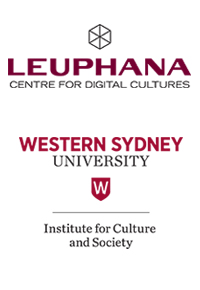Digital Cultures: Knowledge/Culture/Technology
Co-organized by the Centre for Digital Cultures (CDC), Leuphana University and the Institute for Culture and Society (ICS), Western Sydney University, as part of the Knowledge/Culture Series.
Details
Date: 19-22 September, 2018
Venue: Leuphana Universität Lüneburg, Germany
https://digitalculturesconference.org/ (opens in a new window)
Initiated by Armin Beverungen (CDC) and Ned Rossiter (ICS)
Enquiries: submissions@digitalculturesconference.org
Organizing Steering Committee
CDC: Armin Beverungen, Timon Beyes, Lisa Conrad, Mathias Denecke, Randi Heinrichs, Laura Hille, Claus Pias, Daniela Wentz
ICS: Ilia Antenucci, Helen Barcham, Philippa Collin, Gay Hawkins, Tsvetelina Hristova, Liam Magee, Brett Neilson, Ned Rossiter, Teresa Swist
Call for Papers
The advent and ubiquity of digital media technologies precipitate a profound transformation of the spheres of knowledge and circuits of culture. Simultaneously, the background operation of digital systems in routines of daily life increasingly obscures the materiality and meaning of technologically induced change. Computational architectures of algorithmic governance prevail across a vast and differentiated range of institutional settings and organizational practices. Car assembly plants, warehousing, shipping ports, sensor cities, agriculture, government agencies, university campuses. These are just some of the infrastructural sites overseen by software operations designed to extract value, coordinate practices and manage populations in real-time. While Silicon Valley ideology prevails over the design and production of the artefacts, practices and institutions that mark digital cultures, the architectures and infrastructures of its operations are continually rebuilt, hacked, broken and maintained within a proliferation of sites across the globe.
To analytically grasp the emerging transformations requires media and cultural studies to inquire into the epochal changes taking place with the proliferation of digital media technologies. While in many ways the digital turn has long been in process, its cultural features and effects are far from even or comprehensively known. Research needs to attend to the infrastructural and environmental registrations of the digital. Critical historiographies attend to the world-making capacities of digital cultures, situating the massive diversity of practices within specific technical systems, geocultural dynamics and geopolitical forces. At the same time the contemporaneity of digital cultures invites new methods that draw on digital media technologies as tools, and, more importantly, that engage the intersection between media technologies, cultural practices and institutional settings. New organizational forms in digital economies, new forms of association and sociality, and new subjectivizations generated from changing human-machine configurations are among the primary manifestations of the digital that challenge disciplinary capacities in terms of method. The empirics of the digital, in other words, signals a transversality at the level of disciplinarity, methods and knowledge production.
This conference brings together research concerned with studying digital cultures and the ways that digital media technologies transform contemporary culture, society and economy. The hosts specifically encourage approaches to digital cultures emerging from media and cultural theory, along with transnational currents of communications, science and technology studies. We also explicitly invite researchers from digital humanities, digital anthropology, digital sociology, gender studies, postcolonial studies, urban studies, architecture, organisation studies, environmental studies, geography and computer science to engage in this endeavour to develop a critical humanities and cultural studies alert to the operations, materialities and politics of digital cultures.
Speakers include:
- Simon Denny, Artist, Berlin/Auckland
- Jennifer Gabrys, Goldsmiths, University of London
- Orit Halpern, Concordia University
- Nanna Heidenreich, Internationale Filmschule Köln
- Kara Keeling, University of Southern California
- Felix Stalder, Zurich University of the Arts
- Ravi Sundaram, Centre for the Study of Developing Societies (CSDS), Delhi
With more coming soon, including details on spotlight sessions.
Conference themes:
- Histories
- Ecologies
- Economies
- Subjectivities
- Collectivities
- Futures
This conference is organized with the following partners:
Department of Media Studies, University of Siegen; Berlin Institute for Empirical Research in Integration and Migration (BIM), Humboldt University of Berlin; ephemera: theory & politics in organization; Meson Press.
Hosted by
